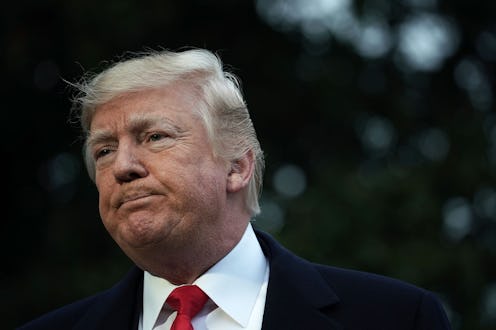News
Trump Is Definitely Maybe Probably Going To Pardon Michael Flynn

The biggest public development in Robert Mueller's Russia investigation came on Dec. 1, when President Trump's former national security adviser pleaded guilty to lying to the FBI about his contacts with the Russian government. It was huge news, but it immediately led many people to wonder: Will Trump pardon Michael Flynn?
The president was asked that question on Monday, but he dodged it.
"I don't want to talk about pardons for Michael Flynn yet," Trump told reporters outside the White House. "We'll see what happens."
He then added, cryptically: "I can say this: When you look at what's gone on with the FBI and with the Justice Department, people are very, very angry."
Although Trump critics have generally been encouraged by Mueller's investigation, they also haven't lost sight of the fact that Trump has pardon power, and that Sword of Damocles has been hanging over the investigation from Day 1. Any Trump associates charged with wrongdoing in conjunction with Mueller's investigation could, at least in theory, receive a pardon from Trump himself, potentially rendering the investigation itself moot.
Mueller has already charged four of the president's associates with crimes, but Flynn is the only one who actually served in the Trump administration. This, combined with the fact that Trump seems to be very personally fond of Flynn, has led many to suspect that, if Trump pardons anybody implicated in the Russia investigation, it will be Flynn.
But while Trump may want to pardon Flynn, doing so could backfire on the president in a few very big ways, legal experts say.
For one, it's important to keep in mind that the president only has the power to pardon federal crimes. Mueller is reportedly investigating an alleged plot by Flynn to kidnap a Muslim cleric living in Pennsylvania and return him to his native Turkey; this could potentially make Flynn vulnerable to state charges of conspiracy to kidnap, according to Fordham law professor Jed Handelsman Shugerman — and Trump does not have the power to pardon state crimes. Flynn's lawyer says the reports of a kidnapping scheme are "outrageous," and "false."
Moreover, it's possible that a Flynn pardon could leave Trump himself exposed by taking away Flynn's ability to plead the fifth. The Fifth Amendment gives Americans the right to not incriminate themselves while testifying against others; if you've already been pardoned for a crime, however, the risk of self-incrimination vanishes. This could become relevant if, for instance, Flynn is ever called to testify against Trump in the future. In such a scenario, he might be forced to answer questions that he might otherwise have been able to avoid by pleading the fifth.
Many have also argued that a Flynn pardon could, in certain circumstances, make it significantly easier to prove that the president himself had obstructed justice. The court documents accompanying Flynn's guilty plea showed that he is now actively cooperating with Mueller's investigation, but Flynn would have little reason to continue his cooperation if he were pardoned. As such, the very act of pardoning Flynn could be seen as an attempt by Trump to interfere with Mueller's investigation, and thus obstruct justice.
A former ethics lawyer for the Obama administration even argued that Trump's use of the word "yet" in his comments Monday ("I don't want to talk about pardons for Michael Flynn yet") could retroactively be considered obstruction of justice itself if the president does ultimately pardon Flynn. This would depend largely on Flynn's actions going forward in the Mueller investigation, however.
There's no question that Trump has the authority to pardon Flynn, and his comments Monday clearly left the door open to him doing so in the future. But is pardoning Flynn actually in the president's own best interest? That's much less clear, and at least a few plausible scenarios, the answer would seem to be an unqualified "no."